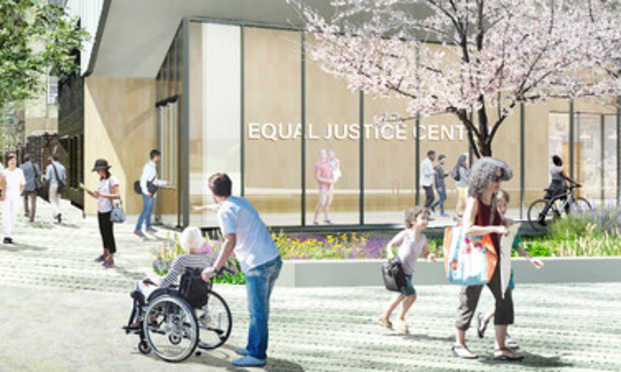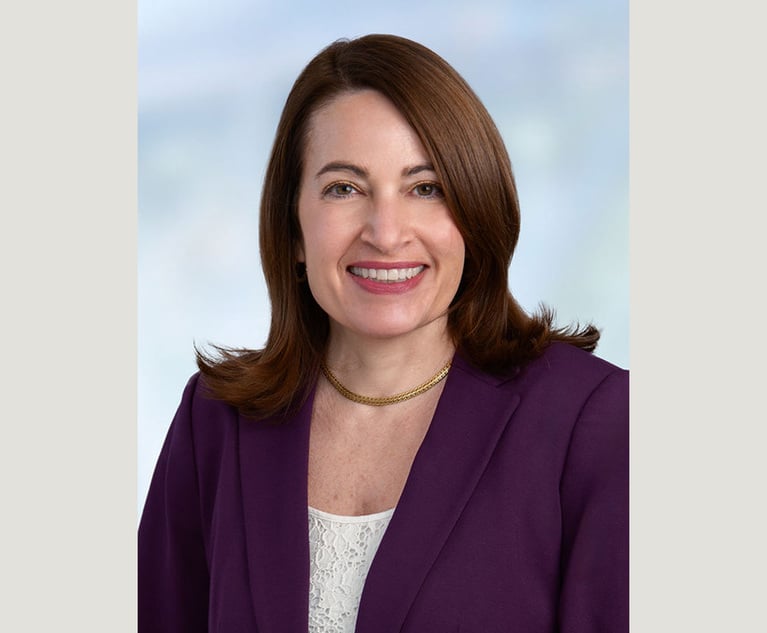Planned Philadelphia Equal Justice Center Set to Break Ground in October
The Philadelphia Bar Foundation is planning to break ground in more ways than one later this year with the construction of the Philadelphia Equal Justice Center, a first-of-its-kind facility that will house nearly a dozen legal aid organizations and social service nonprofits.
June 21, 2019 at 03:14 PM
5 minute read
 Artist's rendering of the planned Philadelphia Equal Justice Center.
Artist's rendering of the planned Philadelphia Equal Justice Center.
The Philadelphia Bar Foundation is planning to break ground in more ways than one later this year with the construction of the Philadelphia Equal Justice Center, a first-of-its-kind facility that will house nearly a dozen legal aid organizations and social service nonprofits.
Construction of the nine-story building at 800-30 Vine St. in Philadelphia is set to begin in October and the center is scheduled to open in 2022. The Bar Foundation, which will itself be based in the center, has secured commitments from 11 other organizations to become tenants: the Center for Advocacy for the Rights and Interests of the Elderly, Community Legal Services, Consumer Bankruptcy Assistance Project, Court Appointed Special Advocates of Philadelphia, Good Shepherd Mediation Program, American Civil Liberties Union of Pennsylvania, Pennsylvania Health Law Project, Philadelphia Legal Assistance, Regional Housing Legal Services, SeniorLAW Center and Women's Law Project.
Laura Powers, director of marketing and development for the Bar Foundation, said the project is aimed at “bringing legal aid organizations together into one building with the goal of reinvesting the savings back into services and programs.”
Jessica Hilburn-Holmes, executive director of the Bar Foundation, said negotiations with potential tenants began in 2012. Initially, Hilburn-Holmes said, the Bar Foundation reached out to more than 30 organizations, but a number of them ultimately decided not to become involved in the EJC project, in some cases because they had already invested in their own office space and weren't inclined to move.
“It hasn't been a quick or easy process,” Powers added. “There have been a lot of negotiations. We give a lot of credit to the boards of these organizations. They did a lot of due diligence to negotiate and have it be viable for them.”
According to Hilburn-Holmes, the EJC will be the first building of its kind in the United States, noting that the closest analog is a program in Canada that co-located a handful of legal aid clinics.
Powers said the EJC's member tenants could potentially save millions of dollars in rent over a 30-year period and Hilburn-Holmes explained that the building is being constructed specifically to house only the 12 organizations that have committed to being tenants.
“People weren't interested in paying for empty space,” Powers said, but added that there will be some shared space, paid for by the Bar Foundation, that will offer conference rooms, a staff lounge and other amenities for use by any of the member tenants.
Hilburn-Holmes said the EJC will also help all of those organizations to save on operational costs by, for example, bulk purchasing office supplies like copy paper and ink and consolidating certain IT functions.
The savings can then be used to enhance the organizations' programs and services, Hilburn-Holmes said.
Karen Buck, executive director of SeniorLAW Center, said her organization spent hundreds of hours conducting cost-benefit analyses before agreeing to join the EJC project.
“To me, it is really about the future and the sustainability of our organization, and certainly about the clients,” Buck said, explaining that, as the senior population in Pennsylvania continues to grow, “the demand for our services far outstrips our ability to help people.”
“Any savings will help us enhance our services,” she added.
But the benefits of co-locating a dozen legal aid organizations goes well beyond cost containment, Powers and Hilburn-Holmes said.
The EJC, they and other member tenants said, aims to facilitate and streamline collaboration among organizations that are already working closely together, which in turn benefits those who come to these organizations seeking help.
For example, explained Arlene Rivera Finkelstein, president of the joint board of Community Legal Services and Philadelphia Legal Assistance, many of the member tenants already refer matters to one another, particularly because clients often aren't sure where to turn initially for assistance. But in the past, she said, having to send a client to another organization's offices in another part of town has resulted in hardships for the client, who would often be forced to take another day off from work, arrange additional transportation or line up more child care.
“It is such a game-changer to say, 'Well, we can potentially help you with situation No. 1, and although we can't directly help with situation 2, our colleagues on the second floor can,” she said, adding, “Literally anything we can do to make it easier for clients to access legal services is a high priority—the highest priority.”
And ultimately, Rivera Finkelstein said, it's the potential to improve overall access to justice in Philadelphia that lured her organizations to the EJC project.
“If there's a way for us to work together as a community to help bring to fruition a one-stop shop for clients to have their needs met in the most efficient and effective way possible, it's really hard to say no to that,” Rivera Finkelstein said. “If we can make it work, we have to try.”
NOT FOR REPRINT
© 2025 ALM Global, LLC, All Rights Reserved. Request academic re-use from www.copyright.com. All other uses, submit a request to [email protected]. For more information visit Asset & Logo Licensing.
You Might Like
View All
Superior Court Directs Western Pa. Judge to Recuse From Case Over Business Ties to Defendant
3 minute read

Neighboring States Have Either Passed or Proposed Climate Superfund Laws—Is Pennsylvania Next?
7 minute readTrending Stories
Who Got The Work
J. Brugh Lower of Gibbons has entered an appearance for industrial equipment supplier Devco Corporation in a pending trademark infringement lawsuit. The suit, accusing the defendant of selling knock-off Graco products, was filed Dec. 18 in New Jersey District Court by Rivkin Radler on behalf of Graco Inc. and Graco Minnesota. The case, assigned to U.S. District Judge Zahid N. Quraishi, is 3:24-cv-11294, Graco Inc. et al v. Devco Corporation.
Who Got The Work
Rebecca Maller-Stein and Kent A. Yalowitz of Arnold & Porter Kaye Scholer have entered their appearances for Hanaco Venture Capital and its executives, Lior Prosor and David Frankel, in a pending securities lawsuit. The action, filed on Dec. 24 in New York Southern District Court by Zell, Aron & Co. on behalf of Goldeneye Advisors, accuses the defendants of negligently and fraudulently managing the plaintiff's $1 million investment. The case, assigned to U.S. District Judge Vernon S. Broderick, is 1:24-cv-09918, Goldeneye Advisors, LLC v. Hanaco Venture Capital, Ltd. et al.
Who Got The Work
Attorneys from A&O Shearman has stepped in as defense counsel for Toronto-Dominion Bank and other defendants in a pending securities class action. The suit, filed Dec. 11 in New York Southern District Court by Bleichmar Fonti & Auld, accuses the defendants of concealing the bank's 'pervasive' deficiencies in regards to its compliance with the Bank Secrecy Act and the quality of its anti-money laundering controls. The case, assigned to U.S. District Judge Arun Subramanian, is 1:24-cv-09445, Gonzalez v. The Toronto-Dominion Bank et al.
Who Got The Work
Crown Castle International, a Pennsylvania company providing shared communications infrastructure, has turned to Luke D. Wolf of Gordon Rees Scully Mansukhani to fend off a pending breach-of-contract lawsuit. The court action, filed Nov. 25 in Michigan Eastern District Court by Hooper Hathaway PC on behalf of The Town Residences LLC, accuses Crown Castle of failing to transfer approximately $30,000 in utility payments from T-Mobile in breach of a roof-top lease and assignment agreement. The case, assigned to U.S. District Judge Susan K. Declercq, is 2:24-cv-13131, The Town Residences LLC v. T-Mobile US, Inc. et al.
Who Got The Work
Wilfred P. Coronato and Daniel M. Schwartz of McCarter & English have stepped in as defense counsel to Electrolux Home Products Inc. in a pending product liability lawsuit. The court action, filed Nov. 26 in New York Eastern District Court by Poulos Lopiccolo PC and Nagel Rice LLP on behalf of David Stern, alleges that the defendant's refrigerators’ drawers and shelving repeatedly break and fall apart within months after purchase. The case, assigned to U.S. District Judge Joan M. Azrack, is 2:24-cv-08204, Stern v. Electrolux Home Products, Inc.
Featured Firms
Law Offices of Gary Martin Hays & Associates, P.C.
(470) 294-1674
Law Offices of Mark E. Salomone
(857) 444-6468
Smith & Hassler
(713) 739-1250






